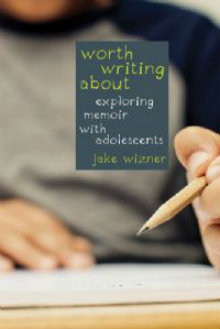Writing Personal Memoir with Tweens & Teens
Worth Writing About: Exploring Memoir with Adolescents
By Jake Wizner
(Stenhouse Publishers, 2015 – Learn more)

A line from Jake Wizner’s Worth Writing About: Exploring Memoir with Adolescents resonates with me: “…in the hands of a skilled writer, the ordinary can be extraordinary.”
The line brings me back to a conference in June. I had the unique pleasure of sitting next to a middle school teacher who also happened to be a professional scorer for state writing assessments. At one point I asked her, “Please tell me. What is the difference between a 3 and a 4?” Without hesitation, she said the writing would make her want to pass it along to another person – read this.
Where is that goal on the state assessment rubric? Furthermore, how do we help kids get there?

This book helps teachers move writers from the ordinary to the extraordinary.
Clearly, Wizner is a practicing writer. The author of two “boundary pushing” young adult novels, Wizner’s immersion in a writing life can easily be documented on Facebook, Twitter, or Google. This is not a small point to consider when reading Worth Writing About. Wizner walks the walk.
What’s our job?
Educators should reflect on how they fit in their classrooms. What role do we play? Are we teachers who do not write who happen to teach writing? Or are we teachers who write who teach writing at a much deeper level than any state assessment could quantify?
Teachers who write will connect at Wizner’s ability to draw a lot out of his student writers. Some teachers will absolutely question how Wizner can get so much from his kids. This point is addressed in the book.
Whenever we read professional texts or attend conferences such as NCTE or ILA, we should be challenged. We should also walk away from a text thinking “how can I apply this to my kids in my community?” I can’t do what Wizner does in exactly the same way with the same precise results, but I can use Worth Writing About to reflect on my practice and perhaps send me to more texts to continue my own professional growth.
Writer to writer
Note how Wizner is able to talk with his students writer to writer. He guides his students to learn how to explain their decisions to him. No reader will miss the fact that much of the student writing shared in the book is personal, jarring, and emotional. It is memoir, but Wizner seems to be able to guide students into a reflective process that enables them to dig deeper.
Wizner does share guiding questions and strategies that help him. But remember, they help him because he is a writer in addition to being a teacher.
Through the lens of teaching memoir, Worth Writing About is a good beginner’s handbook in how to teach writing to adolescents. Here I’m talking about the moves he makes as a teacher. Wizner might call this the understory.
I value Wizner’s perspective of the use of student-created mentor texts in conjunction with professional texts. From my chair, it appears that the student-created texts provide encouragement and sparks for ideas, while the professional texts add the necessary layer of craft.
Writing this deep requires trust
Wizner comes across as a master teacher – one who should be guiding young teachers – because of his ability to develop trust among the conditions of his classroom. The memoirs his students write cannot be produced in classrooms where a writing community has not been established. Furthermore, trust will not grow in a writing classroom without the safety of an authentic community.
A teacher recently asked me at the ILA Conference in Boston, “How do you get your students to write reflections like that?” The teacher referenced two samples that I shared during a presentation. My answer might echo Wizner: “Two reasons. We work on trust all year, and because I value it, we practice reflection a lot. It is how kids learn. And the more we trust one another, the deeper and more honest the reflection.”
When should we teacher memoir?
On another note, memoir is often thrust towards the beginning of a school year since it feels like an easy thing for kids to do – write about themselves. Wizner, an 8th grade teacher, facilitates the memoir unit at the end of the year. He explains that this is because the end of 8th grade is the natural end of one phase of an adolescent’s life. This makes sense to me.
I had never thought of moving memoir to the end. I also like it at the end of the year because students would be better equipped to use more craft tools that the teacher would have modeled from August through April. Also, the writing community would have more time to grow. This matters since the memoir Wizner coaxes out of students is at times raw and sobering.
Additionally, I appreciate that Wizner truthfully shares the glorious failures along with the gripping victories. He tells us what has been (and continues to be) tricky – balancing student writing between significant details and facts that are too personal; the distinguishing between truth and fact; and reaching writers of all levels.
Most importantly, Wizner advocates for frequent student reflection as a significant component of assessing writing:
Where I gather most of my information, though, is through written reflections the students submit, one-on-one writing conferences that I conduct with each student, and completed first drafts that I collect ⅔ through the unit” (101).
Conferring and reflection
No mode of scoring or assessment is perfect – much to the chagrin of teachers everywhere. I know we pine for someone to come along with a panacea for assessment and grades, but the reality (as Wizner confirms) is that nothing can replace conferring and reflection. If anything, I hope Wizner’s text inspires more teachers to do more of each.
After 22 years of teaching, I have learned to cultivate a professional network of teachers who can help me grow. While I had never heard of or read Jake Wizner, I will be paying attention to social media and publishing. I hope he continues sharing his classroom. Actually, I wish lots more teachers shared their classrooms.
Perhaps another understory of Worth Writing About is just that fact: we all need to share more. Everything that Wizner does may not apply to my classroom (or me as an individual), but that does not mean I can’t learn and improve from his text. Quite the contrary, Worth Writing About has given me much to reflect on, and I look forward to richer, more meaningful conversations with colleagues because of this text.
Brian Kelley is an 8th grade teacher in Pennsylvania and a co-director of the Pennsylvania Writing & Literature Project. Currently, he serves as a reviewer for Voices in the Middle and has published professional articles in English Journal and California English. Follow Brian on Twitter (@_briank_), or his blog Walk the Walk, or subscribe to his weekly education podcast (The Classroom) which models individual and group conferring for teachers.






























